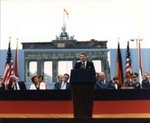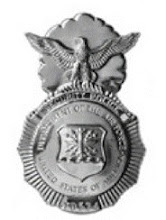
The next conservative I will feature is Grover Cleveland, the 22nd and 24th presidents of the US. He holds the distinction of being the only president to have served two non-consecutive terms. He also was the only Democrat elected between 1860 and 1912. During his term he was confronted by several crises and how he dealt with them gives us a real insight into his concept of government. Read the various essays on this site by clicking the links in the upper right hand corner.
Cleveland, exerting his non-imperialist, hard money policies, and disdain for government interference in most domestic problems would probably place him in the camps of those souls who are caught between constitutional conservatives and libertarians. That's an interesting place to be nowadays and one that is interesting to me. He is often described as a classical liberal (political science term). I find myself in that realm on many political issues today.
Cleveland brandished the veto more often than any president up to his time, a total of 584 times, mostly to veto congressional spending bills. He issued more vetoes than FDR did in 12 years. Cleveland took the position that any spending not enumerated in the constitution was improper for government to undertake. Many of his vetoes involved Civil War pensions for veterans, many of them for injuries not suffered in the war. Pandering anyone? Probably his most famous veto was of the Texas Seed Bill in 1887. The following quote is a manifesto of limited government:
I can find no warrant for such an appropriation in the Constitution, and I do not believe that the power and duty of the general government ought to be extended to the relief of individual suffering which is in no manner properly related to the public service or benefit. Federal aid in such cases encourages the expectation of paternal care on the part of the government and weakens the sturdiness of our national character, while it prevents the indulgence among our people of that kindly sentiment and conduct which strengthens the bonds of a common brotherhood.
Cleveland's Veto of the Texas Seed Bill February 16, 1887
The Seed Bill had authorized funds for farmers in Texas affected by a drought. Cleveland as stated above, did not believe that the constitution authorized public funds to be spent on private matters. Before you condemn Cleveland, the public put forth over $10,000 in private donations to assist the farmers. Cleveland surely approved of that. Today federal funds are routinely appropriated for all forms of disasters. I am ambivalent about this practice. How many times should private homes be rebuilt after they are built on mountainsides prone to mudslides, or in forests prone to wildfires, or on beaches in the path of hurricanes? Should we really pay our money for situations that should be paid for by the occupants and their insurance company? How does government decide who is worthy and who is not?
In foreign affairs, Cleveland held fast to Washington's admonition in his Farewell Address to steer clear of entangling alliances. He stood behind the Monroe Doctrine in the Venezuelan Crisis with Great Britain in 1895. The Venezuelans requested that the US arbitrate in the dispute. Britain wasn't thrilled with any intervention by the US in the matter. Cleveland engaged in some saber rattling and the matter was eventually settled without war.
He refused to annex Hawaii after some Americans fomented a revolution against the queen. Does the name Dole sound familiar in the fruit industry? They were up to their neck in the revolution as their business interest in the islands was worth millions. Congress threatened to vote for annexation in spite of his opposition. Cleveland made it clear that he viewed that as an unconstitutional usurpation of his presidential power. The issue was quickly put on hold for the next administration of McKinley, who approved the annexation Hawaii in 1898.
Cleveland was against the spoils system and insisted on appointing people to government jobs based not on political connections, but on, are you ready for this? Qualifications and fitness for office. He also fought against the political bosses while governor of New Jersey.
I could go on and on about Cleveland. He wasn't the most gifted orator, or thinker of big ideas. In fact, in today's political climate he would derided as a not very bright, thoughtless hater, who hid behind the constitution because he wasn't bright enough to think of it as a "living document."
In short, my kind of guy.










12 comments:
Mr Z would have loved this...he SO would have agreed with Cleveland on the Seed Bill, felt very strongly about that. Thanks, L&0..another super character in American history.
WOULD that ALL our kids were learning this information.xx
Law and Order,
I knew of the events in Hawaii, wasn't aware of Cleveland's opposition. Principled man. Not a lot of that trait present in politics,principle.
Enjoying the series.Thanks!
We the People of the United States, in Order to form a more perfect Union, establish Justice, insure domestic Tranquility, provide for the common defence, promote the general Welfare, and secure the Blessings of Liberty to ourselves and our Posterity, do ordain and establish this Constitution for the United States of America.
--------------------
When the Constitution is used as a tool by Libertarians they seem to think that the tenth amendment is the operative clause and not "promote the general Welfare" (N.B. GENERAL). As a result we get into spitting contests that have us in the current dangerous state of affairs.
Cleveland was also a cornerstone in building the imperial presidency, no? So if we look at the problem as how to moderate the desire to rule (imperial presidency) vs. the need to govern his terms have a few problems.
As for Venezuela, the Europeans wanted payment for their lost property after a civil war (never asking why that civil war occurred in the first place) and we intervened and took over the place. And we are paying for that to this day. no? No line from Cleveland's imperialism to Chavez?
Z,
Cleveland is one of those lost in history presidents. He wasn't a big character, just a nuts and bolts president who believed in following rules. The constitution was his guide. I'm reading Cleveland's book "Presidential Problems." It is a textbook for presidents.
Oso,
There were prinicipled presidents, but they were oftentimes clouded out by the superstars of the presidency. Cleveland just did his job as he saw it. We need people like him.
Ducky,
I love that you checked in. Despite our differences I admire that your comments are well thought out and intellectual. Now to your points.
One thing I preach to my students it to never, I repeat never, take a president, person, decision, or other facet of history out of its time period. The Venezuela situation wasn't about Britain, it was about European imperialism.
The Monroe Doctrine came into play in answer to that. It not only stated opposition to European interventionism, it stated that America would be the deciding factor in the western hemisphere. It's hard to argue against the outcome of this incident.
It is noteworthy that when Cleveland died the Venezuelans ordered their flags lowered to half staff. They genuinely appreciated the interventions of America on their behalf.
Having said that, interventionism by America went a step too far. The intervention in the SA war etc., wasn't certainly motivated by the purest of notions. It did however, get rid of the European influence in this hemisphere that had been in play since 1492.
Your homeboy JFK tried to rectify some of that damage with his Alliance for Progress, based on the Monroe Doctrine. Did it work? I'll leave that to greater minds than mine.
Chavez and Castro are dictators in the Stalinist model. Nothing more and nothing less.
As for the Imperial presidency, it could be argued that Cleveland reclaimed some of the power relinquished by the presidents following the Civil War (Most from Ohio)to the legislative branch. Cleveland and the Republicans certainly had a contentious relationship beginning with the Tenure of Office Act and the president's power to dismiss those he has appointed. Johnson was impeached over that law.
Cleveland fought them and reclaimed the power to hold his appointees accountable. Imperial? I would say he reclaimed power given to him by the constitution. Thanks for your comment.
http://gollygeeez.blogspot.com/2010/02/honoring-my-friend.html
I try not to shill for my own darned posts but of all the people I'd like to have read the link above, it's you, as a teacher.
Please don't take the time to comment, but I think you'll enjoy my true story.
Happy Valentine's Day, to you and Mrs. L&0, xxx
Law and Order,
Castro's main crime was nationalizing American businesses and paying them the undervalued amount they claimed to avoid taxation. We had no problem with Batista's corruption and brutality.With an invasion and numerous assassination plots I don't blame him for being a Stalinist.
Same with Chavez. Anyone on the business end of a coup becomes paranoid about the intentions of the party that instigated the coup.
Oso,
I agree that Castro was a counter to Batista, but he became a communist after offering his services to the US. The Truman Doctrine pledged the US to assist any country to resist communism.
Castro knew, that by embracing communism he would doom his people to the low standard of living they enjoy today. As for Chavez, he's a johnnie come lately and absent oil he would be relegated to he status of Daniel Ortega and the rest of the dictators in Central America.
It is fashionable to condemn America for all the ills of Latin America, but most of it must fall on the Latin Americans themselves. The Europeans are long gone, but the problems linger. Is it our responsibility to cure their ills?
Brazil is doing just fine. They struck out and have discovered oil. They hold a large amount of our debt. Who owns whom?
Z,
I'll check it out.
Law and Order,
I have it on good authority that Ortega suffers from Bill Clinton disease;otherwise known as Lewinsky syndrome.
Oso,
Ortega, Chavez, the whole lot of them are corrupt commies. Until they go democratic, or better republican, (government) they will languish in poverty. History has proved it and documented it. Democracy works. Communism is bankrupt. Thanks for visiting.
Z,
BTW, "Mr. Z would have love this." High praise and I'm humbled.
In every country, we all want to establish justice. If we feel that we are not getting the justice that we want, we really feel bad.
Some of the political leaders nowadays ensure that they are being fair and just to their people. They seek help from their advisers or the estate lawyers. In Ottawa ,when people have some concerns or some issues, they get advice from lawyers for them to make proper decisions.
Well anyways, thanks for your informative post!
Post a Comment